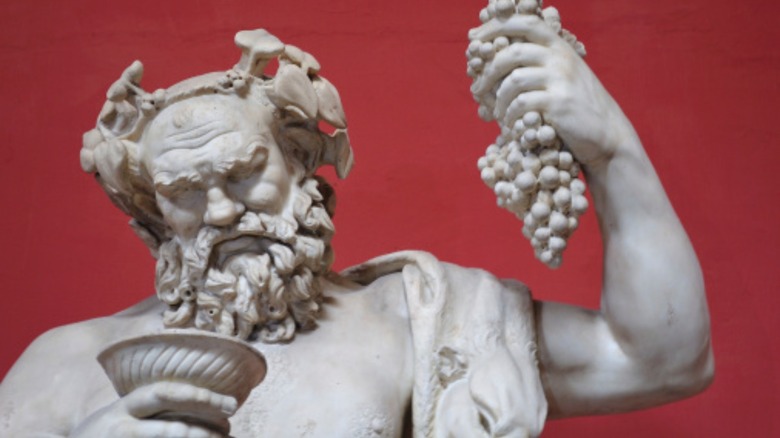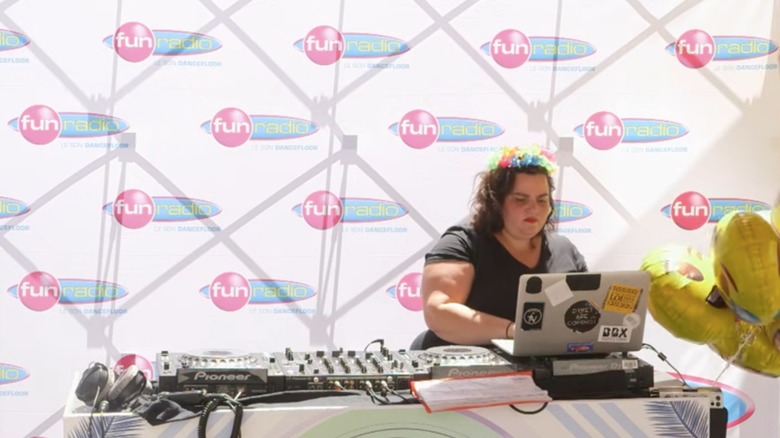The DJ At The Center Of The Olympics Opening Ceremony Controversy Is Speaking Out
Since the dawn of its modern inception, the Olympic Games has marked its beginning with an extravagant opening ceremony, which nowadays is the result of years of planning and coordination by a huge team of creatives representing the host country. As well as the journey of the Olympic torch and a traditional athletes' parade, opening ceremonies have come to include vast performances showcasing the cultural diversity and history of the host country. In 2024, Olympic hosts Paris were looking to build upon the tradition of great opening ceremonies in the first Olympic Games since 2024 to not be hampered by the COVID-19 pandemic. The ceremony was to take place along the city's River Seine, with athletes carried downstream in a succession of flotillas, alongside artistic performances and pyrotechnics.
Sadly, the ceremonies were affected by bad weather, with torrential rain affecting the performances. Reviews were also mixed, with critics arguing that the show felt patchy and thrown together despite its immense scale. More worryingly, however, the show received a vicious backlash online from those who believe a certain scene in the opening ceremony featuring performers in drag was offensive to Christians and blasphemous. Those involved, including DJ Barbara Butch (pictured), have received vile abuse online. But not only have the artists themselves stated that the scene has been utterly misinterpreted by its critics, Butch has made steps to stamp out the abuse which has been flung at her and to bring those responsible to justice.
The scene that caused offense
Paris 2024 opening ceremony director Thomas Jolly has explained that the show he put together was intended as a reflection of the freedoms enjoyed by French citizens in modern society. "I wanted to say that we're a big us, and last night there were ideas from the French Republic, there were inclusive ideas, ideas of kindness, of generosity, ideas of solidarity, which I think we desperately need," Jolly explained, adding: "In France, we're allowed to love who we want, how we want. In France we can believe or not believe, in France we have lots of rights and I wanted to convey those values throughout the ceremony." (per The Guardian) The ambitious show, which was themed along the lines of the principles of "liberty, quality, and fraternity" that underpinned the French Revolution, featured performances by artists including Lady Gaga, Celine Dion, and French heavy metal band Gojira.
But for many Christians and conservatives, the ceremony seemed to have been designed to a more divisive agenda, with the French Catholic Church claiming it "included scenes of derision and mockery of Christianity" (per Reuters). The scene in question seemingly saw drag queens and other members of the queer community — including DJ Barbara Butch — gathered at a long dining table, in what looked to many like a recreation of Leonardo Da Vinci's painting "The Last Supper," one of the most famous devotional artworks of the Christian faith, depicting one of its most important and misunderstood episodes.
The scene was misinterpreted
Images of the scene, titled "Festivity," alongside reproductions of Leonardo Da Vinci's "The Last Supper" have circulated widely on social media, with commentators sharing their anger that such a beloved religious scene had seemingly been parodied and satirized. However, organizers including Thomas Jolly himself have poured cold water on the comparison, claiming that the scene wasn't inspired by the painting or the Last Supper itself at all and that the likeness was entirely unintentional.
Instead, experts agree the scene was intended to be a recreation of the feast of the mythical Greek God Dionysus, as represented in the painting "Feast of the Gods" by 17th Century Dutch painter Jan van Bijlert. As Jolly explained, the eye-popping character dressed in blue is key to understanding the reference. "There's Dionysus who arrives at the table ... Why is he there? Because he's the god of feasting, of wine, and the father of Sequana, the goddess of the River Seine" (per The Guardian). Greek Gods such as Dionysus were said to reside on Mount Olympus, tying the scene to the Olympic Games.
Nevertheless, the organizers felt the need to offer an apology for "Festivity," though Hugo Bardin, a drag artist whose character Paloma appeared in "Festivity," was unimpressed. "An apology means recognizing a mistake, recognizing that you deliberately did something to harm, which was not the case," he said. "What bothers people isn't that we're reproducing this painting. What bothers people is that queer people are reproducing it" (per Reuters).
Barbara Butch's fightback against online abuse
Despite explanations by the artists involved and an official public apology from the organizers of the opening ceremony, the online venom against "Festivity" and those who performed it continued in the days following the opening ceremony. As many news outlets later reported, DJ Barbara Butch, who was central to the tableau in a blue dress and extravagant headdress — possibly representing Apollo, the Greek sun god – has been the victim of vicious online abuse since her appearance in the opening ceremony.
"She has been threatened with death, torture and rape, and has also been the target of numerous antisemitic, homophobic, sexist and anti-grossophobic insults," wrote Butch's lawyer, Audrey Msellati, on the DJ's Instagram page.
Pushing back against the "vile hatred" that her performance has faced, Butch and Msellati have announced that they were filing multiple police complaints against those who have abused and threatened her illegally. "Whatever some may say, I exist," Butch wrote on Instagram. "I've never been ashamed of who I am, and I take responsibility for everything — including my artistic choices. All my life, I've refused to be a victim: I won't shut up."


